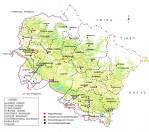 |
| Home Send Money to India Modes of money transfer India BPO India Tourism Taj Mahal Kumarakom Lakes Jaipur Pink city Alappuzha Backwaters Goa Tourism Munnar Hill Station India States Andhra Pradesh Assam Bihar Chattisgarh Goa Gujarat Haryana Himachal Pradesh Jammu and Kashmir Jharkhand Karnataka Kerala Madhya Pradesh Maharashtra Manipur Meghalaya Mizoram Nagaland Punjab Rajasthan Sikkim Tamil Nadu Orissa Tripura Uttar Pradesh Uttaranchal West Bengal India Quick Links Indiaweblinks World Wonders Web 123 Biotech Honeymoon Packages |
India States - Uttaranchal  Uttaranchal is one of the most beautiful and enchanting region of northern India. Nature has endowed this land with so much beauty and spiritual bliss that it is also known as Dev Bhoomi, the Land of Gods. Ganga, Yamuna and scores of other rivers originate in Uttaranchal. Among them Ganga is the most holy and prominent as she represents the soul of India-her rich culture, history and civilization. Uttaranchal lies in the Northern part of India amidst the magnificent Himalayas and dense forests. The state is bordering Himachal Pradesh in the north-west and Uttar Pradesh in the South and has international borders with Nepal and China. Uttaranchal is the 27th state of the Republic of India. It was formed on 9th Nov 2000 and was carved out of Uttar Pradesh after a long struggle of the Uttaranchali people.
Uttaranchal is one of the most beautiful and enchanting region of northern India. Nature has endowed this land with so much beauty and spiritual bliss that it is also known as Dev Bhoomi, the Land of Gods. Ganga, Yamuna and scores of other rivers originate in Uttaranchal. Among them Ganga is the most holy and prominent as she represents the soul of India-her rich culture, history and civilization. Uttaranchal lies in the Northern part of India amidst the magnificent Himalayas and dense forests. The state is bordering Himachal Pradesh in the north-west and Uttar Pradesh in the South and has international borders with Nepal and China. Uttaranchal is the 27th state of the Republic of India. It was formed on 9th Nov 2000 and was carved out of Uttar Pradesh after a long struggle of the Uttaranchali people.
The population of the state is around 7 million. The land area is about 55,845 sq km. The region is mostly hilly (approx 88 percent) and the remaining 12 percent falls in the plains.The state is very rich in natural resources especially water and forests as it has many glaciers, rivers, forests, mountain peaks. The famous peaks of Uttaranchal are Nanda Devi, Kedarnath, Trishul, Bandarpunch and Mt Kamet. The major Glaciers include Gangotri, Pindari, Milam and Khatling. The Ganga, The Yamuna, Ramganga and Sharda are principal rivers of this region.
Uttaranchal tourism and Agriculture Uttaranchal has tremendous potential of developing tourism industry due to the beautiful landscape, religious places, trekking trails, national parks, mountain peaks and historical and archeological sites. Apart from tourism, the rural population is engaged in agriculture. Doon Valley, Nainital district, Udham Singh Nagar and Haridwar districts produce large quantities of food grains. The state has immense potential for the development of horticulture crops-apple, orange, malta,pear, grapes peach, plum appricot, litchi,mango, guava etc are widely produced fruits. The region also holds good promises for developing herbal pharmaceutical industry owing to abundant medicinal plants. The industrial sector of state is insignificant. Due to its water resources the state has the capacity to generate many mega watts of power. There are 17 hydro-electric projects already producing electricity and many ambitious power projects including Tehri Dam are under construciton.
 The native people are Garhwali/Kumaoni and more than 90% of them are Hindus. Many also colloquially call themselves Pahari meaning "hill person" to distinguish themselves from Desis of the rest of India. Most of them identify themselves in the upper castes. Other ethnic communities in the region include Nepali who have arrived over the past century from the neighbouring country of Nepal, and the Tibatan migrants settled called as the Jadh, Marcha and Shauka on the Indo-Tibetan frontier, collectively known as the Bhotiya, and nomadic cattle herders known as Gujjar in the southern Terai region. Many Punjabis after the partition of India, Bengalis, and Tibetans of Eastern Tibet region (KHAMPA) have also settled in the southern plains part of the state. Kumaoni and Garhwali dialects are spoken is Kumaon and Garhwal region respectively. Jaunsari and Bhotia is also spoken in the region by some Tribal Communities. In various regions a mixture of both Kumaoni and Garhwali is also spoken. The city population however converse mostly in Hindi. The native people are Garhwali/Kumaoni and more than 90% of them are Hindus. Many also colloquially call themselves Pahari meaning "hill person" to distinguish themselves from Desis of the rest of India. Most of them identify themselves in the upper castes. Other ethnic communities in the region include Nepali who have arrived over the past century from the neighbouring country of Nepal, and the Tibatan migrants settled called as the Jadh, Marcha and Shauka on the Indo-Tibetan frontier, collectively known as the Bhotiya, and nomadic cattle herders known as Gujjar in the southern Terai region. Many Punjabis after the partition of India, Bengalis, and Tibetans of Eastern Tibet region (KHAMPA) have also settled in the southern plains part of the state. Kumaoni and Garhwali dialects are spoken is Kumaon and Garhwal region respectively. Jaunsari and Bhotia is also spoken in the region by some Tribal Communities. In various regions a mixture of both Kumaoni and Garhwali is also spoken. The city population however converse mostly in Hindi.
|
|
|
|

